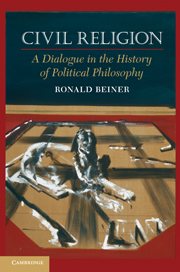Book contents
- Frontmatter
- Contents
- Preface and Acknowledgments
- Introduction
- Part I Machiavelli, Hobbes, Rousseau
- 1 Rousseau's Problem
- 2 The Machiavellian Solution
- 3 Moses and Mohammed as Founder–Princes or Legislators
- 4 Refounding and “Filiacide”
- 5 The Hobbesian Solution
- 6 Behemoth
- 7 Geneva Manuscript
- 8 Social Contract
- Part II Responses to (and Partial Incorporations of) Civil Religion within the Liberal Tradition
- Part III Theocratic Responses to Liberalism
- Part IV Postmodern “Theism”
- Conclusion
- Index
- References
3 - Moses and Mohammed as Founder–Princes or Legislators
Published online by Cambridge University Press: 05 June 2012
- Frontmatter
- Contents
- Preface and Acknowledgments
- Introduction
- Part I Machiavelli, Hobbes, Rousseau
- 1 Rousseau's Problem
- 2 The Machiavellian Solution
- 3 Moses and Mohammed as Founder–Princes or Legislators
- 4 Refounding and “Filiacide”
- 5 The Hobbesian Solution
- 6 Behemoth
- 7 Geneva Manuscript
- 8 Social Contract
- Part II Responses to (and Partial Incorporations of) Civil Religion within the Liberal Tradition
- Part III Theocratic Responses to Liberalism
- Part IV Postmodern “Theism”
- Conclusion
- Index
- References
Summary
Islam is politics or it is nothing.
– Ayatollah KhomeiniIt is obviously not an accident that of the four instances of exemplary legislation discussed by Rousseau in Book II, chapter 7 of the Social Contract, no less than three of them are theocratic civic orders (namely those founded by Moses, Mohammed, and Calvin, Lycurgus's Sparta being the one exception) – any more than it is an accident that Moses receives the privileged treatment that he does as a founder-prince in chapters 6 and 26 of The Prince. This in itself impresses upon us the urgency of the civil-religion concerns in Rousseau – and also of course in Machiavelli before him. What is more, Rousseau makes sure that the implicit lesson is not overlooked by the reader, for he concludes his chapter “On the Legislator” with an explicit insistence that the great and effective Legislator must see to it that the decisions of his own sublime reason are placed “in the mouth of the immortals in order to convince by divine authority those who cannot be moved by human prudence” (and then cites the authority of Machiavelli's civil-religion doctrine!). Rousseau ends with the suggestion that Warburton is wrong to maintain “that politics and religion have a common object for us”; it is rather the case “that at the origin of nations, one serves as an instrument of the other” [Il ne faut pas…conclure…que la politique et la religion aient parmi nous un objet commun, mais que, dans l'origine des nations, l'une sert d'instrument à l'autre.]. This is precisely what defines civil religion.
So Rousseau cites Moses and Mohammed as founders of religions who were also great founder-legislators, whereas Machiavelli cites only Moses. But is this really true? How does Mohammed figure in Machiavelli's analysis of founder-princes? To solve this crucial riddle, we need to look quite closely at The Prince's famous invocation of “armed prophets.” Machiavelli bestows upon Cesare Borgia the lavish attention that he does by virtue of Cesare's ambition to include himself in the class of founder-princes celebrated in chapter 6 of The Prince. He makes it into chapter 7 not on the strength of his actual achievements, but on account of the ambition that nearly gets him into chapter 6; he ends up on what I called in the last chapter the B team, but he has his eyes set on the A team. If Machiavelli had been writing The Prince in 1813 rather than 1513, it is clear that chapter 7 would have been devoted to another great loser, namely Napoleon – and for the same reason! Napoleon too, failure though he was, nonetheless had his eyes set on the right goal: the paganization of Christianity, and the institution of a new world-historical civil religion. One of Napoleon's biographers writes in regard to Napoleon's library that “the Koran…is housed among the political works, beside the Bible and Montesquieu”; and he puts the following speech into Napoleon's mouth: “I became a good Catholic when I wanted to finish the war in Vendée; in Egypt, I was a Turk; when I wished to win over the Italians, I was an ultramontane. If I reigned over the Jews, I should rebuild Solomon's temple.” Nietzsche worships Napoleon for the same reason that Machiavelli waxes lyrical about Cesare, namely that they were at least candidates for the kind of higher politics practiced by a Moses or a Mohammed.
- Type
- Chapter
- Information
- Civil ReligionA Dialogue in the History of Political Philosophy, pp. 29 - 36Publisher: Cambridge University PressPrint publication year: 2010



